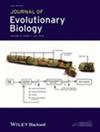配偶竞争在物种演化和分化中的作用:系统综述。
IF 2.1
3区 生物学
Q3 ECOLOGY
引用次数: 0
摘要
配偶竞争在决定繁殖成功率、形成种群表型变异和影响物种分化方面起着至关重要的作用。然而,关于性选择在分化和物种形成中的作用的研究却过多地关注配偶选择。在这里,我们综合了有关配偶竞争如何促进物种分化的文献,并整合了有关种群内性选择--交配系统、生态学和配偶选择--的概念。通过这种综合,我们对配偶竞争如何可能导致物种分化做出了可检验的预测。然后,我们通过系统地回顾配偶竞争在一系列进化、生态和地理背景下对种群分化的影响,确定文献中对这些预测的现有支持程度。我们对目前的证据进行了广泛评估,找出了现有数据中的不足和需要检验的假设,并为未来的工作勾勒出了前景广阔的方向。一个主要发现是,配偶竞争通常会在最初的分化发生后促进进一步的分化,例如在二次接触时和异地种群之间。重要的是,目前关于配偶竞争如何导致分化的假说并不能完全解释观察到的模式。虽然许多研究的结果符合负频率依赖选择、激动性特征位移和生态选择的预测,但约有 30% 的研究结果不符合现有的概念模型。本综述针对配偶竞争可能很重要但研究不足的情况提出了未来的研究目标,包括生态环境以及配偶选择和配偶竞争之间的相互作用如何促进或阻碍物种的分化和演化。本文章由计算机程序翻译,如有差异,请以英文原文为准。
The role of mate competition in speciation and divergence: a systematic review.
Competition for mates can play a critical role in determining reproductive success, shaping phenotypic variation within populations, and influencing divergence. Yet, studies of the role of sexual selection in divergence and speciation have focused disproportionately on mate choice. Here, we synthesize the literature on how mate competition may contribute to speciation and integrate concepts from work on sexual selection within populations - mating systems, ecology, and mate choice. Using this synthesis, we generate testable predictions for how mate competition may contribute to divergence. Then, we identify the extent of existing support for these predictions in the literature with a systematic review of the consequences of mate competition for population divergence across a range of evolutionary, ecological, and geographic contexts. We broadly evaluate current evidence, identify gaps in available data and hypotheses that need testing, and outline promising directions for future work. A major finding is that mate competition may commonly facilitate further divergence after initial divergence has occurred, e.g., upon secondary contact and between allopatric populations. Importantly, current hypotheses for how mate competition contributes to divergence do not fully explain observed patterns. While results from many studies fit predictions of negative frequency dependent selection, agonistic character displacement, and ecological selection, results from ~30% studies did not fit existing conceptual models. This review identifies future research aims for scenarios in which mate competition is likely important but has been understudied, including how ecological context and interactions between mate choice and mate competition can facilitate or hinder divergence and speciation.
求助全文
通过发布文献求助,成功后即可免费获取论文全文。
去求助
来源期刊

Journal of Evolutionary Biology
生物-进化生物学
CiteScore
4.20
自引率
4.80%
发文量
152
审稿时长
3-6 weeks
期刊介绍:
It covers both micro- and macro-evolution of all types of organisms. The aim of the Journal is to integrate perspectives across molecular and microbial evolution, behaviour, genetics, ecology, life histories, development, palaeontology, systematics and morphology.
 求助内容:
求助内容: 应助结果提醒方式:
应助结果提醒方式:


